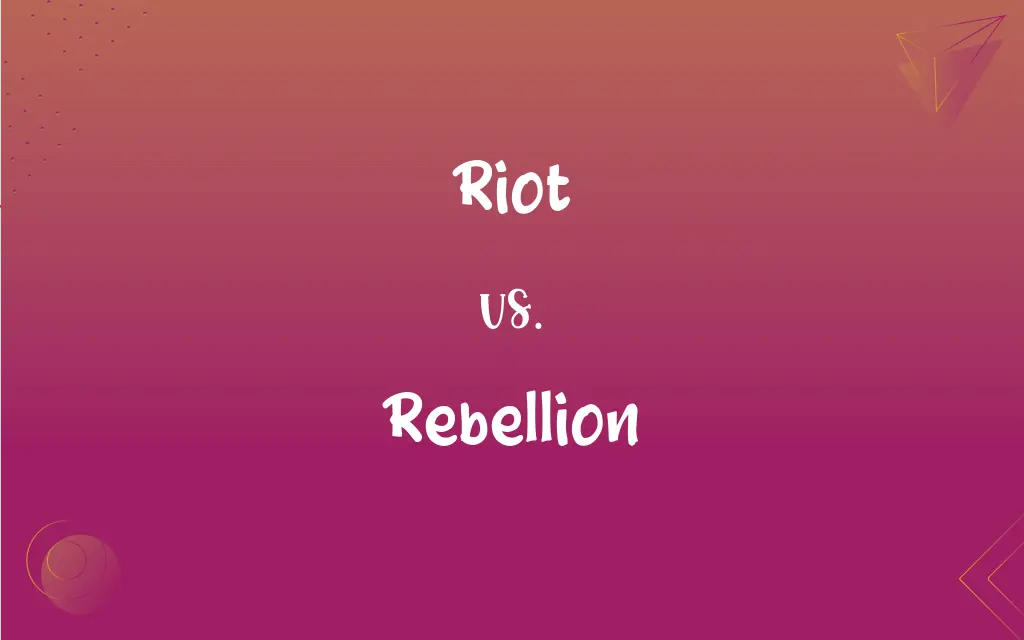Riot vs. Rebellion: What's the Difference?
Edited by Aimie Carlson || By Janet White || Published on November 5, 2023
A riot is a violent disturbance by a crowd; a rebellion is an organized resistance against authority or control.

Key Differences
A riot and a rebellion, though both indicative of social unrest, differ in nature, scale, and purpose. A riot typically refers to a spontaneous outburst of violence by a group or crowd, often driven by immediate grievances or emotions. On the contrary, a rebellion involves organized resistance against an established authority or system, often driven by long-standing political, social, or economic grievances.
While a riot may be triggered by a singular event or incident, such as a controversial verdict or a perceived act of injustice, rebellions usually stem from deeper systemic issues that a group aims to address or change. Riots, in their sporadic nature, might not have a clear end goal or leadership, whereas rebellions often have identifiable leaders, strategies, and objectives.
Another distinguishing feature between a riot and a rebellion is the duration and scale. Riots tend to be short-lived, sometimes lasting only a few hours to a couple of days. Rebellions, on the other hand, can span weeks, months, or even years, encompassing larger territories and involving sustained efforts.
Both riots and rebellions are indicative of social friction and can result in significant changes or reforms if the underlying issues are addressed. However, it's essential to recognize their distinct characteristics to understand their causes, impacts, and potential resolutions effectively.
Comparison Chart
Nature
Spontaneous outburst
Organized resistance
ADVERTISEMENT
Trigger
Often a singular event or incident
Deep-rooted systemic issues
Duration
Typically short-lived (hours to days)
Longer duration (weeks to years)
Leadership & Structure
Often lacks clear leadership or structure
Usually has identifiable leaders and objectives
Purpose
Immediate grievances, might lack clear end goal
Specific aims against an established authority
Riot and Rebellion Definitions
Riot
A riot refers to tumultuous activities by a group displaying collective aggression.
The sports fans created a riot after the match was canceled.
ADVERTISEMENT
Rebellion
Rebellion implies a deliberate defiance against a ruling power or system.
The colonists' rebellion was the start of a new nation.
Riot
A riot is a public commotion with potential vandalism or looting.
The peaceful protest unexpectedly turned into a riot by nightfall.
Rebellion
A rebellion is an act of organized resistance against established authority.
The rebellion sought to overthrow the corrupt regime.
Riot
A riot encompasses unruly group behaviors causing chaos and disorder.
The city had not seen such a large-scale riot in decades.
Rebellion
Rebellion encompasses efforts to bring about political or social change.
The rebellion was driven by demands for equal rights.
Riot
A riot can be an uncontrolled gathering leading to property damage and clashes.
Officials were unprepared for the riot that erupted downtown.
Rebellion
A rebellion is a sustained movement challenging the status quo.
The rebellion, though small in number, was impactful in its message.
Riot
A wild or turbulent disturbance created by a large number of people.
Rebellion
A rebellion is an uprising against perceived oppression or injustice.
The youth led the rebellion against the draconian laws.
Riot
(Law) A violent disturbance of the public peace by three or more persons assembled for a common purpose.
Rebellion
Open, armed, and organized resistance to a constituted government.
Riot
An unrestrained outbreak, as of laughter or passions.
Rebellion
An instance of this.
Riot
A profusion
The garden was a riot of colors in August.
Rebellion
Defiance toward an authority or established convention
An act of adolescent rebellion.
Riot
Unrestrained merrymaking; revelry.
Rebellion
An instance of this.
Riot
Debauchery.
Rebellion
(uncountable) Armed resistance to an established government or ruler.
The government is doing its best to stop rebellion in the country.
Riot
(Slang) An irresistibly funny person or thing
Isn't she a riot?.
Rebellion
(countable) Defiance of authority or control; the act of rebelling.
Having a tattoo was Mathilda's personal rebellion against her parents.
Riot
To take part in a riot.
Rebellion
(countable) An organized, forceful subversion of the law of the land in an attempt to replace it with another form of government.
The army general led a successful rebellion and became president of the country.
Riot
To live wildly or engage in uncontrolled revelry.
Rebellion
The act of rebelling; open and avowed renunciation of the authority of the government to which one owes obedience, and resistance to its officers and laws, either by levying war, or by aiding others to do so; an organized uprising of subjects for the purpose of coercing or overthrowing their lawful ruler or government by force; revolt; insurrection.
No sooner is the standard of rebellion displayed than men of desperate principles resort to it.
Riot
To waste (money or time) in wild or wanton living
"rioted his life out, and made an end" (Tennyson).
Rebellion
Open resistance to, or defiance of, lawful authority.
Riot
A tumultuous disturbance of the public peace by a large group of people, often involving violence or damage to property.
The protests began peacefully but turned into riots after several days.
Rebellion
Refusal to accept some authority or code or convention;
Each generation must have its own rebellion
His body was in rebellion against fatigue
Riot
(figurative) A wide and unconstrained variety.
In summer this flower garden is a riot of colour.
Rebellion
Organized opposition to authority; a conflict in which one faction tries to wrest control from another
Riot
A humorous or entertaining event or person.
Riot
Wanton or unrestrained behavior or emotion.
Riot
(obsolete) Excessive and expensive feasting; wild and loose festivity; revelry.
Riot
(intransitive) To create or take part in a riot; to raise an uproar or sedition.
The nuclear protesters rioted outside the military base.
Riot
To act in an unrestrained or wanton manner; to indulge in excess of feasting, luxury, etc.
Riot
(transitive) To cause to riot; to throw into a tumult.
Riot
(transitive) To annoy.
Riot
Wanton or unrestrained behavior; uproar; tumult.
His headstrong riot hath no curb.
Riot
Excessive and exxpensive feasting; wild and loose festivity; revelry.
Venus loveth riot and dispense.
The lamb thy riot dooms to bleed to-day.
Riot
The tumultuous disturbance of the public peace by an unlawful assembly of three or more persons in the execution of some private object.
Riot
To engage in riot; to act in an unrestrained or wanton manner; to indulge in excess of luxury, feasting, or the like; to revel; to run riot; to go to excess.
Now he exact of all, wastes in delight,Riots in pleasure, and neglects the law.
No pulse that riots, and no blood that glows.
Riot
To spend or pass in riot.
[He] had rioted his life out.
Riot
A public act of violence by an unruly mob
Riot
A state of disorder involving group violence
Riot
A joke that seems extremely funny
Riot
A wild gathering involving excessive drinking and promiscuity
Riot
Take part in a riot; disturb the public peace by engaging in a riot;
Students were rioting everywhere in 1968
Riot
Engage in boisterous, drunken merry-making;
They were out carousing last night
Riot
A riot is a sudden and violent disturbance by a crowd.
The controversial decision led to a riot in the city center.
FAQs
What's the typical duration of a rebellion?
Rebellions can last weeks, months, or even years, depending on the objectives and opposition faced.
What often triggers a riot?
Riots can be triggered by singular events like controversial verdicts or acts perceived as unjust.
What primarily characterizes a riot?
A riot is characterized by a sudden, violent disturbance by a crowd.
What drives a rebellion?
A rebellion is driven by organized resistance against an established authority or system.
Do riots always involve violence?
While many riots involve violence, it's not a strict criterion; they can be marked by chaos and disorder without physical harm.
Who usually leads a rebellion?
Rebellions often have identifiable leaders or groups guiding actions and strategies.
Can a rebellion be peaceful?
Yes, rebellions can use nonviolent methods, but they involve active resistance against authority.
Can a riot lead to a rebellion?
Yes, if the underlying grievances of a riot aren't addressed, it can escalate into a more organized rebellion.
What are common causes of rebellions?
Rebellions often arise from long-standing political, economic, or social grievances.
Do all rebellions succeed in their aims?
No, while some rebellions achieve their goals, others face suppression or fail due to various reasons.
Can a rebellion be considered a revolution?
If a rebellion leads to significant socio-political change or regime change, it can be termed a revolution.
Can riots bring about change?
While riots highlight grievances, sustained change typically requires organized efforts, which rebellions are better suited for.
Is a protest the same as a riot?
No, while a protest expresses disapproval or objection, a riot involves violent disturbance. Protests can turn into riots, though.
Can a riot have a positive outcome?
Though chaotic, riots can draw attention to issues and potentially lead to dialogue or reforms.
Are rebellions legal?
Rebellions often defy established laws, making participants subject to legal consequences, depending on the jurisdiction.
How can riots be prevented?
Addressing underlying grievances, ensuring justice, and maintaining open communication can help prevent riots.
How do authorities typically respond to riots?
Authorities often deploy law enforcement or military forces to restore order during riots.
What distinguishes a rebellion from a civil war?
While both involve conflict, a civil war is more extensive, often involving larger factions and territory. A rebellion can escalate into a civil war.
Are riots common after sports events?
While not common, some high-stakes or emotionally-charged sports events can lead to riots, especially if fans feel aggrieved.
Do rebellions always demand regime change?
No, while some rebellions aim for regime change, others seek specific reforms or rights within the existing system.
About Author
Written by
Janet WhiteJanet White has been an esteemed writer and blogger for Difference Wiki. Holding a Master's degree in Science and Medical Journalism from the prestigious Boston University, she has consistently demonstrated her expertise and passion for her field. When she's not immersed in her work, Janet relishes her time exercising, delving into a good book, and cherishing moments with friends and family.
Edited by
Aimie CarlsonAimie Carlson, holding a master's degree in English literature, is a fervent English language enthusiast. She lends her writing talents to Difference Wiki, a prominent website that specializes in comparisons, offering readers insightful analyses that both captivate and inform.






































































